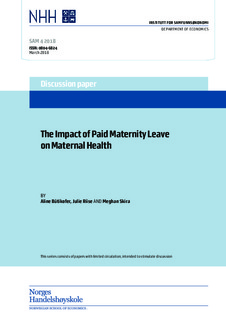The Impact of Paid Maternity Leave on Maternal Health
Working paper

View/
Date
2018-03Metadata
Show full item recordCollections
- Discussion papers (SAM) [658]
Abstract
We examine the impact of the introduction of paid maternity leave in Norway in 1977 on maternal health. Before the policy reform, mothers were eligible for 12 weeks of unpaid leave. Mothers giving birth after July 1, 1977 were entitled to 4 months of paid leave and 12 months of unpaid leave. We combine Norwegian administrative data
with survey data on the health of women around age 40 and estimate the mediumand long-term impacts of the reform using regression discontinuity and difference-inregression discontinuity designs. Our results suggest paid maternity leave benefits are protective of maternal health. The reform improved a range of maternal health outcomes, including BMI, blood pressure, pain, and mental health, and it increased health-promoting behaviors, such as exercise and not smoking. The effects were larger for first-time and low-resource mothers and women who would have taken little unpaid leave in the absence of the reform. We also study the maternal health effects of subsequent expansions in paid maternity leave and find evidence of diminishing returns to leave length.